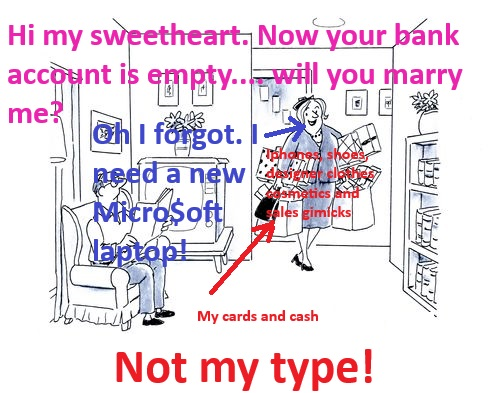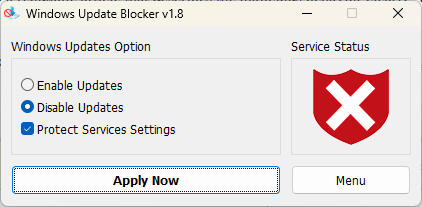Think of the Cybermen from the BBC series, Doctor Who.
In one Doctor Who episode (The Age of Steel was it?) the cybermen - who wanted ALL humans to become cybermen - or else! - explained "upgrading is mandatory'. Asked by the president: 'And if I refuse?' The cyberman replied, 'you are not compatible and will be deleted' i.e. killed immediately. FYI: Doctor Who is a well known British Science fiction series for those not in the know.
But? Does that remind you of anything?
The way that Mictro$oft force updates your computers nowadays since Wondows 10 came along, with no settings you can use to stop it locking up when preparing to install 'updates' and then rebooting in the middle of work. I have had Windows cause three consecutive lessons to be cancelled due to updates (i.e. fixes for problems whih should have been fixed before leaving the factory - I am NOT interested in providing Micro$oft with a free quality control service at the expense of my work time and sanity); I have had Windows tell me to go to hell when I am about to begin a class or during a presentation.
And that is not all. There are numerous examples of abusive features in software which I neither need nor want. But first, a little bit of history.
More than two decades ago, I dumped Excel due to Micro$oft - for the umpteenth time - changing the menus for no apparent or logical reason. Many disrupted classes and cancelled online lessons later, I am at the end of my tether. So, more recently, I made a decision to wean myself and my entire teaching operation off of Microsoft's (and other greedy - and often American) - corporation's software products and to do away with the hell of licencing costs and the accompanying disruption and stress, not to mention forced updates and endless rebooting. I am also able to make my entire operation stronger, cheaper and which I am perfectly able maintain by myself - making my own decisions solely for my own reasons instead of having them forced on me. Therefore, in the process, becoming significantly more resilient to both natural and man-made disasters, and significantly less prone to the whims and profit-driven motives of foreign IT corporations and their narcissistic billionaire owners. I am at my wits end with constant upgrading, security patching of Windows operating systems.
My servers went entirely over to Unix in 2002 following the Code Red and Nimda worms. My web, gopher and gemini services - and others too - are entirely run on Unix ever since. Then around 20 years ago I dumped Excel entirely for several reasons - not least, the fact that Micro$oft (or Microshaft if you prefer) kept changing the damned menus for no good reason. And they kept changing the file formats too, for no better reason but to force people to participate in their perpetual upgrade and obsolescence cycle. It is disruptive, costly, bad for the planet in the e-waste it produces (think Wirth's Law of you will!). Besides being sick and tired of patching/upgrading/removing malware on Micro$oft systems becoming a full-time job. Next, I dumped from my teaching laptop Office 365 when it demanded that I be connected to the internet to open a document which I wrote myself and which was saved on my own hard drive!!! Then along Windows 10 came - and there were no longer settings one could use to stop it disrupting my work. It is my damned computer!!!
These days, I have been producing my teaching materials using Libreoffice ever since. Online, at Yancheng, SXNU - and will soon be doing so at Fuzhou University of International Studies & Trade in Fujian province. The time has come to finally sever the last link with Microsoft. New teaching computers will use Ubuntu Linix desktop complete with Libreoffice and other required packages. And Mozilla Thunderbird for email and Usenet. Any Windows software I must have will be run in Virtualbox - until I find alternatives for Linux.
Like my exit from the megaexpensive UK, the progressive withdrawl and phase out of Micro$oft crapware has been a 'death by a thousand cuts'. And it is about bloody time the process ran to completion. I rest my case!
These are examples of abusive features in software which I neither need nor want:
Back door: any feature of a program that enables someone who is not supposed to be in control of the computer where it is installed to send it commands. This includes forced updates.
Digital restrictions management, or DRM: functionalities designed to restrict what users can do with the data on their computers.
Jail: system that imposes censorship on application programs. Example: Apple only allowing you to install from their own app store on IOS.
Tether: functionality that requires permanent (or very frequent) connection to a server. Think of Office 365!
Tyrant: system that rejects any operating system not authorised by the manufacturer. Think of UEMI.
And I do not want to be forced into participating in Micro$oft's 'planned obsolescence licencing, cost and disruption cycle' either.

NOT WELCOME HERE
A friend of mine, a physician - now retired, once spent over 3000 GBP on Adobe software. Suddenly one day it stopped working. Why? Adobe had gone over to the the in-fashion rip off model of monthly subscriptions. He re-installed it: the same thing happened again the same day. Since then he formatted the hard drive and kept that computer entirely off the internet to stop the same thing happening again - and he now only ever allows his Linux machine to go anywhere near the internet. Oh, and the worst performing PDF viewer is? Adoslowbe Acrobat reader. A fatal case of 'featuritis' -how many (mis)features are needed to view a damn PDF file??? And please do NOT send me PDF files to sign - use ODT or RTF instead please.
Why I hate Microsoft, it's business practices and its products
Wirth's Law - so, you are paying through the nose for an upgrade? To run the latest bug ridden bloatware from Micro$oft, and paying double for the privilege?
So then, what will replace Micro$oft crapware?
NOT apple either! See ...And why I am not a fan of Apple either. Megaexpensive, captive market, consumables? No way!!!
The Free Software Foundation provides all you need to know about the 'why': Proprietary Software Is Often Malware
Why I have no intention of using Windows on any new devices from this day forth
Microsoft's Software is Malware

'She scammed me in marriage, and now she wants to scam me post divorce...'
Apple's Operating Systems Are Malware

Whereas the Windows update blocker (above) has prevented any fuurther disruption to lessons, classes, marking or presentations since I started actively using it, it is diabolical that I should be forced to taking such draconian measures to stop Micro$oft using its backdoors to control MY COMPUTER, PAID WITH USING MY OWN MONEY, TO BE USED AS MY WORK TOOL, IN MY WORK TIME. I might sound as if I am impersonating Benjamin in George Orwell's 'Animal Farm' - but whereas 'protective' software is available to patch intentional and unintentional security holes in Micro$oft crapware, I would rather have no crapware and no protective software. I rest my case.
One more revelation. In July 2024, a security add-on from an obscure (until that time!) software company called Crowdstrike (or should I say 'Clownstrike'), had a bug which trapped Micro$oft systems in a perpetual reboot loop unless one booted into safe mode and removed the bug-ridden software. And this was intended to improve the security of Micro$oft crapware which has long been riddled with intentional and non-intentiomal security holes! As a result, flights around the world were grounded, the Entire UK National Health service was out of action for days, and people in the UK could not even buy a train ticket. While the rest of the world was trapped in chaos, China was unaffected - but why?
Because China was using its own version of Linux called Kylin. And an open version of Kylin, Open Kylin, is available as FOSS. My point? Why are supposedly independent countries like the UK using the crapware (paid for by the long suffering tax payer) from greedy and monopolistic companies like Micro$oft who have no loyalty to anyone or anything other than their own cash flows? My point, if you have not realised by now, is that China is smart enough not to trust its criticl national instrastructure to Micro$oft. Neither should the rest of us.
And one last thing. As I am teaching in China, I am glad that WeChat (essential in China) is available for Linux too.
Good
reasons to be cheerful - From my previous site, cotexfood-trading.com - closed in 2019, the forrunner of dfdn.info
You
can finally dump Windows!
Several
people people have written in asking questions along the lines of,
"why
are you dumping Windows and using Linux instead?"
The
answer is simply that we now have overwhelming technical, financial
and perhaps most importantly, moral reasons
for no longer wishing to use Microsoft software – if it can be
avoided. Here are just a few…
Moral
Reasons
I
believe that in its attempts to protect its corporate interests,
Microsoft is trampling over its users basic human rights.
As
a British National and an EU citizen, I morally object to being
forced to pay to use the proprietary products of a large,
monopolistic, foreign corporation in order to access and manipulate
my data. I am not
the only EU citizen with this view .
I
especially object to Microsoft's deployment of Digital Rights
Management techniques, effectively criminalising its users before
any crime has been committed.
I
resent the constant upgrades that force the purchase of new
hardware,
I
further resent paying for new versions of software that still don't
deliver what was promised with the previous version.
I
dislike having to waste valuable computing resources running
layer-upon-layer of virus checker, spyware detector etc, just to
patch gaping holes in Microsoft security.
I
bitterly resent having to "reauthenticate"
software just because I have changed a hard drive or upgraded my
hardware – thus effectively informing a foreign company, in a
foreign jurisdiction of my computing activity.
I
finally have a real choice
The Microsoft
faithful tell
us that the release of Vista is the
most significant IT event of the year.
However I would venture to suggest that IT historians of the future
may consider of at least equal importance is the final arrival of
desktop Linuxes, genuinely suitable for the average user. For the
first time since Microsoft attained its desktop dominance in the mid
1990's, there is some serious, usable and affordable competition for
Microsoft Windows on the desktop.
Advantages
We
tried Windows Vista and
we were deeply disappointed with its dismal performance and shocked
by its exorbitant cost. So, following a short feasibility study, we
made the business decision in 2007 May to abandon Vista. Instead we
are concentrating our intellectual efforts on deploying Ubuntu Linux
and phasing out all flavours of Microsoft Windows on all our
operational desktop computers. This has already proven a very good
decision for us. We have no viruses, no worms and no spyware on any
of our Linux-powered desktop or laptop computers. Almost all the
software we need is free and the hardware needed to run it is
currently around a third of the cost of that needed to run Vista.
In
a nutshell, all our moral and business values seem to converge upon
the same conclusion, “bye
bye Microsoft!”
Disadvantages
The
main disadvantage of
deploying Linux initially was the difficulty finding equivalents of
our favourite Windows applications.
Windows
apps on Linux?
After
a little experimentation, we discovered that we could run several of
our legacy Windows applications on Linux using an open source product
called WINE. Then we learned that we
could run many more Windows applications using
a very affordable commercial implementation of WINE created by
Codeweavers, called Crossover.
Even
better, Crossover is not some “virtual machine” arrangement.
Crossover lets us run Windows applications as if they were “real”
Linux applications. Surprisingly, some Windows applications actually
run better under WINE/Linux that they do in Windows! At time of
writing 2007-08-04, it seems that the only remaining business
application that we need to make work under Linux is PHPRunner.
I am very glad to say that Sergey Kornilov and his team at xLineSoft
have been very supportive of this and I believe we are not far from
achieving our goal.
Conclusion
If
you are prepared to continue swelling Microsoft's coffers despite its
highly questionable business practices – not to mention the poor
quality and the lamentably flawed security of its products – then
that is a matter for your conscience. I would not dare to tell anyone
how you should run your business. However, I would ask you to
understand that like an increasing number of people, I strenuously
avoid trading with corporations whose business practices I find
morally unacceptable. Another reason to be cheerful...
You
can finally dump Windows!
Several
people people have written in asking questions along the lines of,
"why
are you dumping Windows and using Linux instead?"
The
answer is simply that we now have overwhelming technical, financial
and perhaps most importantly, moral reasons
for no longer wishing to use Microsoft software – if it can be
avoided. Here are just a few…
Moral
Reasons
I
believe that in its attempts to protect its corporate interests,
Microsoft is trampling over its users basic human rights.
As
a British National and an EU citizen, I morally object to being
forced to pay to use the proprietary products of a large,
monopolistic, foreign corporation in order to access and manipulate
my data. I am not
the only EU citizen with this view .
I
especially object to Microsoft's deployment of Digital Rights
Management techniques, effectively criminalising its users before
any crime has been committed.
I
resent the constant upgrades that force the purchase of new
hardware,
I
further resent paying for new versions of software that still don't
deliver what was promised with the previous version.
I
dislike having to waste valuable computing resources running
layer-upon-layer of virus checker, spyware detector etc, just to
patch gaping holes in Microsoft security.
I
bitterly resent having to "reauthenticate"
software just because I have changed a hard drive or upgraded my
hardware – thus effectively informing a foreign company, in a
foreign jurisdiction of my computing activity.
I
finally have a real choice
The Microsoft
faithful tell
us that the release of Vista is the
most significant IT event of the year.
However I would venture to suggest that IT historians of the future
may consider of at least equal importance is the final arrival of
desktop Linuxes, genuinely suitable for the average user. For the
first time since Microsoft attained its desktop dominance in the mid
1990's, there is some serious, usable and affordable competition for
Microsoft Windows on the desktop.
Advantages
I saw others
struggling with Windows Vista and
I was deeply disappointed with its dismal performance and shocked
by its exorbitant cost. So, following a short feasibility study, we
made the business decision in 2007 May to abandon Vista. Instead we
are concentrating our intellectual efforts on deploying Ubuntu Linux
and phasing out all flavours of Microsoft Windows on all our
operational desktop computers. This has already proven a very good
decision for us. We have no viruses, no worms and no spyware on any
of our Linux-powered desktop or laptop computers. Almost all the
software we need is free and the hardware needed to run it is
currently around a third of the cost of that needed to run Vista.
In
a nutshell, all our moral and business values seem to converge upon
the same conclusion, “bye
bye Microsoft!”
Disadvantages
The
main disadvantage of
deploying Linux initially was the difficulty finding equivalents of
our favourite Windows applications.
Windows
apps on Linux?
After
a little experimentation, we discovered that we could run several of
our legacy Windows applications on Linux using an open source product
called WINE. Then we learned that we
could run many more Windows applications using
a very affordable commercial implementation of WINE created by
Codeweavers, called Crossover.
Even
better, Crossover is not some “virtual machine” arrangement.
Crossover lets us run Windows applications as if they were “real”
Linux applications. Surprisingly, some Windows applications actually
run better under WINE/Linux that they do in Windows! At time of
writing 2007-08-04, it seems that the only remaining business
application that we need to make work under Linux is PHPRunner.
I am very glad to say that Sergey Kornilov and his team at xLineSoft
have been very supportive of this and I believe we are not far from
achieving our goal.
Conclusion
If
you are prepared to continue swelling Microsoft's coffers despite its
highly questionable business practices – not to mention the poor
quality and the lamentably flawed security of its products – then
that is a matter for your conscience. I would not dare to tell anyone
how you should run your business. However, I would ask you to
understand that like an increasing number of people, I strenuously
avoid trading with corporations whose business practices I find
morally unacceptable.


